How many shofar blasts must be heard on Rosh Hashana?
The search for the answer to this question led the Sages to a most unlikely personality.
One hundred blasts of the shofar are based on the one hundred cries of the mother of Sisera (Talmud Rosh Hashana 33b).
Sisera’s mother peers intently out of the window waiting for her son’s return from battle. She quickly begins to lose hope. She fears the worst. Reality begins to set in. Sisera’s mother begins to weep. Her son has been killed. (Book of Judges 5:28-30)
Why do the Sages chose Sisera’s mother to learn from? Sisera was a sworn enemy of the Jewish People. Sisera’s mother is initially portrayed as waiting for him to return with the spoils of war, taken from the vanquished Israelites. On a certain level, this woman, whose name we do not know, would not seem to be the object of our sympathy and her loss would not be regarded as anything to mourn about.
Perhaps this is the point that the Sages are making: so great is the grief of any parent for the loss of a child, that we all are left completely bereft. The universality and commonality of suffering over the loss of a child transcends names and identities.
Remarkably, in a lesser known midrashic insight, the Sages say that the one hundred sounds of the shofar symbolize a different cry: the one hundred cries of our matriarch Sarah, upon seeing her son Isaac departing for the Akeidah, fulfilling the Divine call to Abraham to sacrifice his only son. She cries over the loss of her most precious and only child. (Torah Shleimah, Parshat Chayei Sarah)
As someone who has experienced the painful loss of a child, I cannot help but find it striking that the Sages have attached the shofar blasts to the cry of a bereaved parent. It indicates an awareness on the part of our spiritual masters that child loss epitomizes a loss of deep pain, a lingering wound, an enduring cry.
Notably, according to the earliest translation, the biblical name for Rosh Hashana, ‘Yom Teruah’ (Numbers 29:1), means ‘a day of moaning,’ Yom Yevavah (Targum on the Torah). When we hear the shofar blasts, they are not to be heard merely as blasts of a horn, they are a cry to God. On Rosh Hashana the shofar teems with many tears. We cry to God on this day.
The cry of the shofar symbolizes not only our personal tears but summon us to hear the cry of others. In the sobbing of the shofar we are to hear the whimper of a bereaved mother and a bereaved father longing for their beloved child; a husband desperately missing a wife who has passed, a wife longing for her husband who has left this world; the cry of a child for a parent who is no longer present.
This distinct dimension of the shofar is expanded upon in the teachings of the Kabbalah. The shofar’s cry is understood as our struggle to decipher the ways of God and to penetrate His hiddenness (Halachic Man p 62). The shofar blasts are a cry, our cry, to our Father in Heaven with a request that he help us carry on and give us greater clarity.
This brings us to another aspect of our tears on Rosh Hashana and to one more mother we encounter on this holy day. In the Haftorah of the day, we hear Rachel crying: “Thus saith the Lord: A voice is heard…bitter weeping, Rachel weeping for her children; she refuses to be comforted for her children, because they are not.”
Rachel cries for her children. She prophetically sees ‘her children’, the Jewish people, enduring great misfortune and crushing pain over the centuries. Rachel empathizes with the suffering of others.
But Rachel’s tears are not in vain. Her cry is heard on high. God answers Rachel with encouragement and optimism: ‘Refrain your voice from weeping, and thine eyes from tears… there is hope for the future (Jeremiah 31:15-16).”
God assures Rachel that His Presence is always at our side. Although people may cry in quiet desperation, it is never in lonely desperation. Rachel’s tears are redemptive.
In synagogue the shofar blasts are followed with these integral words:
Ashrei Ha’am Yodei Teruah,
“Praised are the people who truly understand the message of the shofar.”
Through the cry of the shofar we share our troubles, our uncertainties and our hopes with the Holy One. The shofar also summons us to hear the cry of others. Along with this cry is the cry for greater clarity and understanding when life seems so confusing and our understanding is obscured.
On this holiest of days, we learn we are never alone; our tears matter and are heard above by our Father in Heaven.

